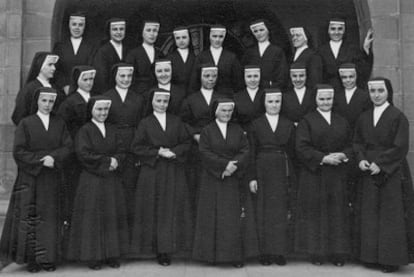Ex-nun condemns baby trafficking
Mercedes Sánchez claims illegal adoptions were organized at a Tenerife orphanage, and recounts stories of child abuse by the mother superior
Between 1963 and 1967, she worked in a Tenerife orphanage, which is at the center of child-trafficking allegations. Four months after leaving, she renounced the sisterhood. Today, aged 73, Mercedes Sánchez García explains why.
"I summoned all my strength after reading the article in EL PAÍS about Liberia Hernández [stolen from the Tenerife orphanage aged eight] and the claim by Mother Superior Juana Alonso that she had never met her. I remember Liberia's mother perfectly, gripping the bars of the patio and asking for her daughter. When I started to work there, Liberia had already been given up for adoption, but the other girls told me that the woman who came to the bars was her mother. She kept coming to the orphanage for years afterwards. She didn't abandon her. Sister Juana got rid of her saying she must forget about it; that Liberia was better off with her new family."
Mercedes also confirms Liberia's account of the mistreatment of children at the orphanage. "Juana changed after meeting a woman who ran shelters for single mothers in Bilbao. She started to hit the girls. I once found her beating a 15-year-old, off out of sight. The girl was pleading for mercy. I told Juana what she was doing was immoral."
It wasn't to be the last clash between the two nuns, who belonged to the Daughters of Charity order. "Sister Juana would go to the single mother's shelter in Bilbao to collect newborns to give them up for adoption in Tenerife from where they were distributed. I don't think those children know that they are adopted," says Mercedes.
The former nun was once sent to Valencia for a baby herself. "Before I left Sister Juana told me to invent a name for the baby in case I was stopped by the police. I was given the child after handing over an envelope, as I'd been instructed to do. I don't know what was in it - maybe a check. He had been born that day and he was beautiful. He was so gorgeous that I asked, 'But has his mother seen him?' The nun got angry and told me the mother had no business seeing him because she'd given him up and that I had to take the baby away at once.
"Back in Tenerife, when I asked Juana why there were no documents with the baby, Sister Juana was furious. She shouted: 'I've been doing this for 20 years and this upstart dares to reproach me! Kiss the floor and get out.' I was stunned. The next day the child had gone. When I asked after him, I was told he was in good hands."
Sister Juana was mother superior for 19 years although standard terms in her order were four years, a stint which could be extended to six. Furious with Mercedes for questioning her authority and legality of the adoptions, she later had her expelled from the order. Hit by a crisis of faith, Mercedes gave up the sisterhood altogether.
"Sister Juana was arrogant. She behaved like a demi-goddess. She destroyed people's lives. And I don't believe she regrets anything she did." Mercedes does. She wishes she had approached the woman who called out for her daughter Liberia, through the orphanage bars.

Mothers brainwashed
"The nuns brainwashed the girls. They told them it was a dishonor to have a baby on your own. And they promised them work. I always thought there was something murky going on." María Pilar Angelines Fuertes Sánchez is now a prison nurse, but many years ago she was a nun in the Carmelitas del Sagrado Corazón de Jesús order.
Between 1981 and 1984, she worked at the Nuestra Señora de Loreto Clinic in Madrid.
"A huge number of young women came to this clinic to give birth, accompanied by nuns who said the girls wanted to give up their babies. They said we had to keep them separate from the other mothers and cots so that they didn't hear the babies' cries and change their mind."
"When they were giving birth, the adoptive parents would turn up. They were well-off. They were very happy when they left with their babies, who they dressed up in expensive clothes." María Pilar and other workers were told not to speak to the young mothers. They were also told the adoptive parents would pay the clinic bill. The older nuns instructed that the babies be inscribed as the biological children of the adoptive parents. But María Pilar's knowledge of baby trafficking dates back to 1958, when she was a 16-year-old novice in Portugal and saw similar events. She remembers two little sisters, who were given up for adoption in Valencia and separated.
Tu suscripción se está usando en otro dispositivo
¿Quieres añadir otro usuario a tu suscripción?
Si continúas leyendo en este dispositivo, no se podrá leer en el otro.
FlechaTu suscripción se está usando en otro dispositivo y solo puedes acceder a EL PAÍS desde un dispositivo a la vez.
Si quieres compartir tu cuenta, cambia tu suscripción a la modalidad Premium, así podrás añadir otro usuario. Cada uno accederá con su propia cuenta de email, lo que os permitirá personalizar vuestra experiencia en EL PAÍS.
¿Tienes una suscripción de empresa? Accede aquí para contratar más cuentas.
En el caso de no saber quién está usando tu cuenta, te recomendamos cambiar tu contraseña aquí.
Si decides continuar compartiendo tu cuenta, este mensaje se mostrará en tu dispositivo y en el de la otra persona que está usando tu cuenta de forma indefinida, afectando a tu experiencia de lectura. Puedes consultar aquí los términos y condiciones de la suscripción digital.








































